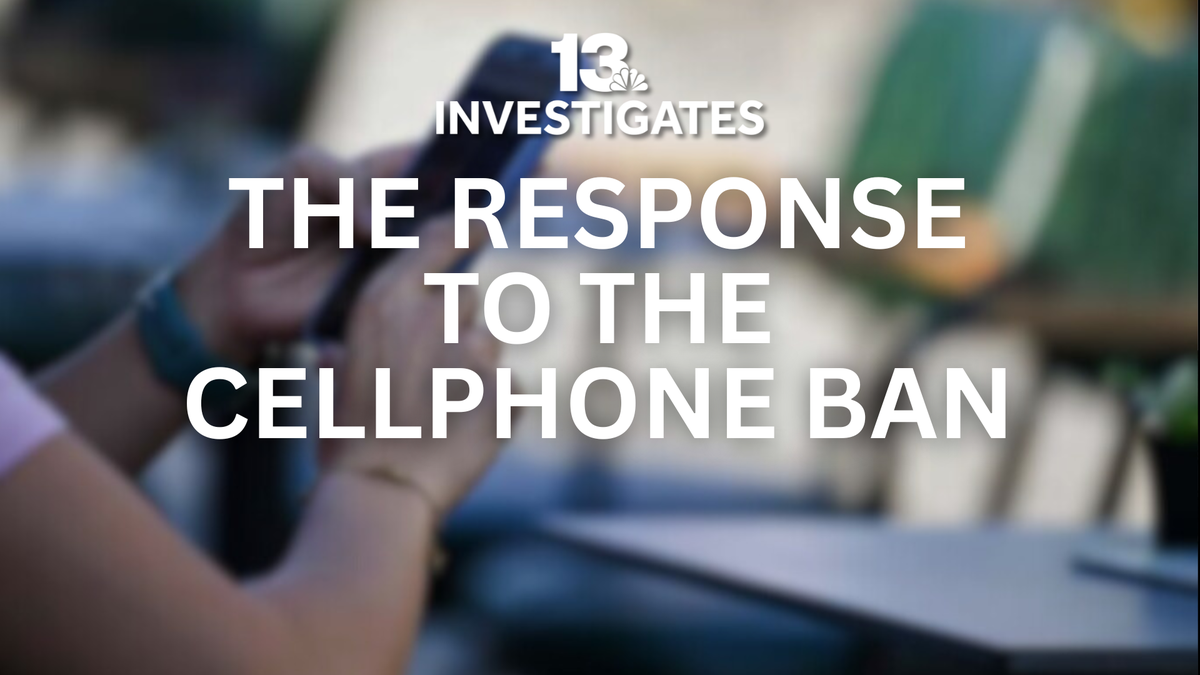Alabama schools are experiencing a significant change this year as the Focus Act, a new law banning cellphones in classrooms, takes effect, aiming to improve focus and reduce distractions in schools across the state. The Focus Act allows each school district to decide how to implement the cellphone ban. At Hewitt-Trussville, the policy requires students to keep their phones in lockers until the end of the school day.At Hewitt-Trussville High School, teachers and students are adjusting to the new policy.Initial responsesTeachers at Hewitt-Trussville High School have welcomed the change.”I was excited about it,” said Deangelia Dailey, a biology teacher. “I knew that it was probably going to be a positive effect,” Bryan Hinds, a history teacher at the school, said.”It was such a blessing. I was very excited to hear about the Focus Act,” math teacher Lauren Wooten said. However, some students initially reacted with skepticism.”I was really, like, kind of skeptical about it,” Emery Edge, an 11th grader, said.”I thought it was like a hoax,” senior Angie Ruiz said. “Honestly, I thought people were just, like, trying to fear monger that, like, everything was getting so strict.” Classroom shiftsDespite initial hesitations, students are adapting to the new environment and overcoming some challenges to get schoolwork accomplished.”There’s been some things I’ve definitely had to adjust to,” Edge said.Ruiz explained, “Sometimes we use our phones to, like, pull kids out of class and record voice memos for interviews and then just pull from that. But now we have to, like, use our Chromebooks and, like, even record on the Chromebooks or just type it out manually instead of doing it the way we were traditionally doing it.” Teachers have noticed a positive shift in the classroom dynamics.”Cheating was a big issue,” Wooden said. “So I’m not having to deal with all that. And so I feel like I’m having more time to be able to spend time on math, which is the important part.” Hinds said, “Less distraction. Students, when we have discussions, they actually talk. And, it’s just been, it’s just a better learning environment.” “Most of the kids now are really, really focused on what we’re actually doing in class,” Daily said.”It’s let education take a step forward, with no limitations and no distractions,” said Chad Summers, who teaches broadcasting and serves as the public relations director for Trussville City Schools. Wooten said, “I really thought we would be taking up more phones. I thought more students would be a little bit resistant to the change. But I think everybody’s kind of bought in.”Beyond academicsTeachers said the ban has fostered a more social environment among students.”They actually talk to each other,” Summers said. “Students that may not even be in the same friend group. They may not be in the same room running the same circles. They’ll get to know each other.” Ruiz has noticed this change, saying, “I just feel like there’s more connection between people, or like it’s almost like forcing us to socialize more. I actually have a friend in class and she has started carrying a deck of cards with her so that she could, like, do magic tricks or play games when there’s, like, free time in class.”While the cellphone ban is still new, the initial feedback from Hewitt-Trussville High School is positive.Summers said, “For the most part, I would say this has been a win.”Across the countryWVTM 13 took a look across the country to see which states have implemented cellphone bans, which states have restrictions and which states do not have policies. Check out the interactive map below.Can’t see the interactive map above? Click here.
Alabama schools are experiencing a significant change this year as the Focus Act, a new law banning cellphones in classrooms, takes effect, aiming to improve focus and reduce distractions in schools across the state.
The Focus Act allows each school district to decide how to implement the cellphone ban. At Hewitt-Trussville, the policy requires students to keep their phones in lockers until the end of the school day.
At Hewitt-Trussville High School, teachers and students are adjusting to the new policy.
Initial responses
Teachers at Hewitt-Trussville High School have welcomed the change.
“I was excited about it,” said Deangelia Dailey, a biology teacher.
“I knew that it was probably going to be a positive effect,” Bryan Hinds, a history teacher at the school, said.
“It was such a blessing. I was very excited to hear about the Focus Act,” math teacher Lauren Wooten said.
However, some students initially reacted with skepticism.
“I was really, like, kind of skeptical about it,” Emery Edge, an 11th grader, said.
“I thought it was like a hoax,” senior Angie Ruiz said. “Honestly, I thought people were just, like, trying to fear monger that, like, everything was getting so strict.”
Classroom shifts
Despite initial hesitations, students are adapting to the new environment and overcoming some challenges to get schoolwork accomplished.
“There’s been some things I’ve definitely had to adjust to,” Edge said.
Ruiz explained, “Sometimes we use our phones to, like, pull kids out of class and record voice memos for interviews and then just pull from that. But now we have to, like, use our Chromebooks and, like, even record on the Chromebooks or just type it out manually instead of doing it the way we were traditionally doing it.”
Teachers have noticed a positive shift in the classroom dynamics.
“Cheating was a big issue,” Wooden said. “So I’m not having to deal with all that. And so I feel like I’m having more time to be able to spend time on math, which is the important part.”
Hinds said, “Less distraction. Students, when we have discussions, they actually talk. And, it’s just been, it’s just a better learning environment.”
“Most of the kids now are really, really focused on what we’re actually doing in class,” Daily said.
“It’s let education take a step forward, with no limitations and no distractions,” said Chad Summers, who teaches broadcasting and serves as the public relations director for Trussville City Schools.
Wooten said, “I really thought we would be taking up more phones. I thought more students would be a little bit resistant to the change. But I think everybody’s kind of bought in.”
Beyond academics
Teachers said the ban has fostered a more social environment among students.
“They actually talk to each other,” Summers said. “Students that may not even be in the same friend group. They may not be in the same room running the same circles. They’ll get to know each other.”
Ruiz has noticed this change, saying, “I just feel like there’s more connection between people, or like it’s almost like forcing us to socialize more. I actually have a friend in class and she has started carrying a deck of cards with her so that she could, like, do magic tricks or play games when there’s, like, free time in class.”
While the cellphone ban is still new, the initial feedback from Hewitt-Trussville High School is positive.
Summers said, “For the most part, I would say this has been a win.”
Across the country
WVTM 13 took a look across the country to see which states have implemented cellphone bans, which states have restrictions and which states do not have policies. Check out the interactive map below.
Can’t see the interactive map above? Click here.


